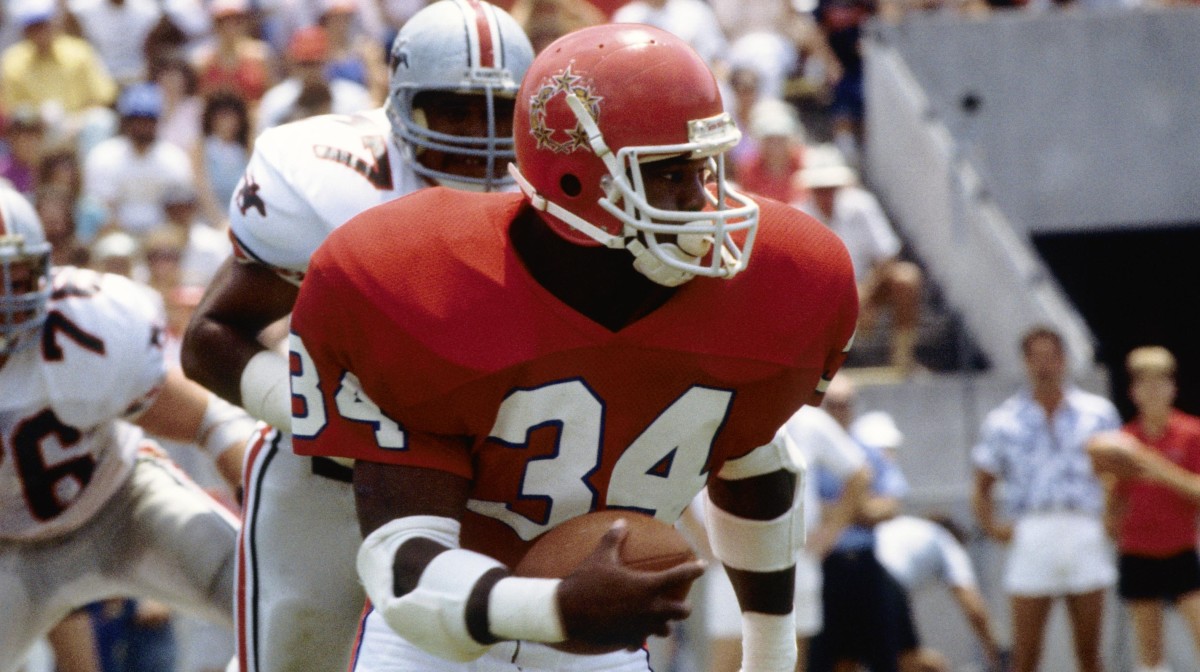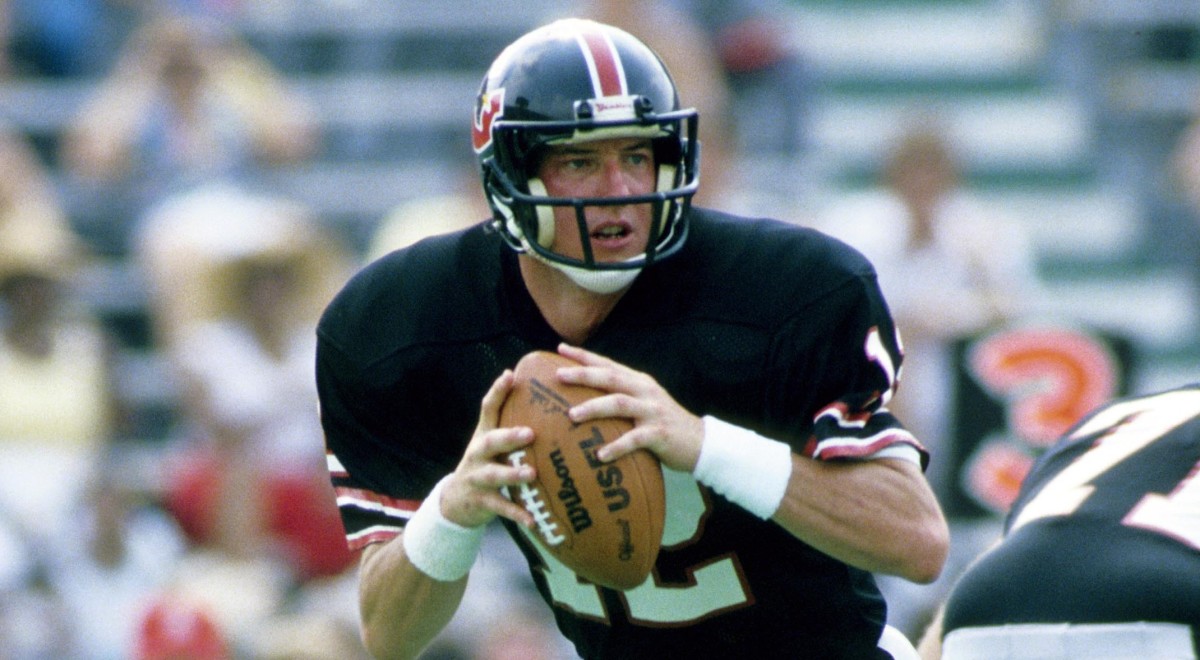Herschel Walker, Jim Kelly Among Original USFL’s Fantasy Stars
The USFL postseason quietly begins this weekend. The New Jersey Generals and Birmingham Stallions both enjoyed banner years in the first USFL season since the league shuttered following a three-year run, 1983-85.
The revived league performed well enough from a ratings perspective throughout the spring. Still, it remains to be seen if the eight-team league can catch on the way it did in the 1980s.
Star power kept the USFL in business for three seasons back in the day, with the likes of Herschel Walker and Jim Kelly taking the field on Sundays. The league was home to some former NFL players and some college football standouts, though it’s not drawing the top-end talent it did many decades ago.
Football is consumed differently now than it was during the USFL’s first go-round. The explosion in popularity of fantasy football was well over 10 years away. Fantasy football existed in the 1980s, but not in the easily accessible, handheld manner it does today. Millions of people have some skin in the fantasy game today. A very minor fraction of that number even knew what fantasy football was back then.
But what if fantasy football was big during the USFL’s first run?
The 2022 USFL season hasn’t produced any historic statistical seasons from a fantasy standpoint. In fairness, the season is shorter than the NFL’s, but there still aren’t many eye-popping offensive stats even when accounting for the 10-game season.
Some of the best fantasy seasons ever occurred nearly 40 years ago in the USFL, way before online leagues were popularized in the late 1990s. Players, some of whom went on to NFL careers, posted season stat lines on par with or even better than today’s high-scoring, pass-happy league.
These are the best fantasy seasons among quarterbacks, running backs and wide receivers from the USFL’s first three seasons.
(Note: The USFL season ran 18 games, even more than the recently extended 17-game NFL slate. All player per-game averages refer to 18-game seasons unless otherwise noted. Running back and receiver stats are based on PPR scoring and quarterback scoring is standard. All USFL stats via statscrew.com.)
1983
Michigan Panthers’ signal caller Bobby Hebert was the top-scoring fantasy quarterback in the USFL’s inaugural season. Hebert, who graced the cover of SI in 1991, had a decorated rookie year. He tossed a league-high 27 touchdowns, threw for 3,568 yards and added three more scores on the ground on his way to a championship. Hebert also threw 17 interceptions to finish with 238.2 fantasy points across 18 games. Those numbers earned him USFL Player of the Year and Most Outstanding Quarterback, but he would have been a second-tier quarterback option in today’s NFL. Hebert totaled 240.22 points, which would’ve been the 18th-most in 2022, just ahead of Mac Jones. Accounting for points per game, Hebert averaged just 13.34, putting him in company with Geno Smith and Mike White.

Herschel Walker burst onto the scene in the USFL with the New Jersey Generals after winning the Heisman Trophy at Georgia. He carried the ball a whopping 412 times for 1,812 yards and 17 touchdowns, all of which led the league. Walker added 53 catches for 489 yards and a receiving touchdown to lead all players with 386.1 fantasy points. Those numbers hold up. He would have led all running backs in points this season, beating out Jonathan Taylor for the top spot. Even when looking at Walker’s point per game average, his mark of 21.45 ppg would have been good for the fourth-most at the position behind Derrick Henry, Taylor and Austin Ekeler.
Trumaine Johnson of the Chicago Blitz was the top fantasy receiver in the league in ‘83, and outpaced Hebert’s top target, Anthony Carter, and Tampa Bay Bandits pass catcher Eric Truvillion. Johnson led the league in both catches (81) and yards (1,322) and his 10 touchdowns were the third-most in the league. Both of those numbers that topped the league back in the day would’ve been good, but not necessarily league-leading marks. Johnson’s fantasy campaign saw him finish with 273.2 points, which would have put him at WR8 between Dionate Johnson and Mike Evans, good company to keep. His per game average of 15.2 points would have put him at a low-end WR2 in 2022.
1984
Highly touted rookie Jim Kelly opted to play in the USFL before eventually suiting up for the Bills, where he would later assemble a Hall of Fame career. Kelly put together the finest statistical season of his career in his first season with the Houston Gamblers on his way to MVP and Rookie of the Year honors. He paced the league with 44 touchdown passes, 5,219 yards and 26 interceptions. Kelly made plays with his legs, too, scrambling for 493 yards and five scores. He also was taken down plenty, racking up an eye-boggling 75 sacks in 18 games. His 412.06 points would have made him the QB2 this past season, fittingly only behind Bills quarterback Josh Allen. On a per game basis, Kelly would have been the QB3 last season, behind Justin Herbert and ahead of Tom Brady.
Tampa Bay Bandits running back Gary Anderson prevented Walker from being the best fantasy back in the USFL three years running. Anderson ran for just 1,008 yards but he found the end zone on the ground a league-leading 19 times. Add in two more scores through the air and 66 catches for 682 yards and Anderson had Walker beat by 0.3 points for the top scoring back in the league. Walker had 21 total touchdowns as well and he outrushed Anderson, but as the PPR crowd will understand, the receiving advantage ultimately gave Anderson the edge as he finished with 361 points to Walker’s 360.7. They would have finished second and third in 2022, respectively, behind Taylor. Their per game averages would have been just over 20 points per game, good for RB4 and RB5 in 2022.
No surprise, the top receiver that year was Kelly’s No. 1 target: Richard Johnson. He caught 115 passes that season, a USFL record and a number that would hold up in today’s game. Johnson turned those receptions into 1,455 yards and 15 touchdowns. He hit the receiving triple crown and finished with 350.5 fantasy points. Still, he finished well behind fellow triple crown winner Cooper Kupp’s all-time season in 2022: 439.5 points. Johnson would have beat out Davante Adams by six points last year for a WR2 finish. Johnson’s average of 19.47 points per game in the ‘84 season paced the league, though it would have ranked fourth a season ago.

1985
Kelly’s reign continued his sophomore season. His statistics weren’t as gaudy, but he was more efficient overall and he still finished as the top quarterback in the league. Kelly tossed 39 touchdown passes, once again the most in the league, and cut his interceptions down to 19. He also threw for 4,623 yards and he became more of a pocket passer, rushing much less than he did as a rookie and, as a result, he wasn’t sacked nearly as often. Kelly totaled 325.92 fantasy points in the last USFL season before it shuttered. That ‘85 season was still a fine output by modern standards—Kelly would have been the QB9 by total points though just outside the top 12 QBs by his per game average (18.1).
Walker reclaimed his throne as the top USFL running back with his finest season as a pro. He set a league record with 2,411 rushing yards on a whopping 438 carries. Walker, who played out his USFL career with the Generals, found the end zone 17 times on the ground and once through the air. He added 467 receiving yards on 37 catches to flirt with a ludicrous 3,000 yards from scrimmage. Walker finished with 453.8 PPR points, which would have been comfortably the most in the NFL this season among all players. In fact, Walker’s ‘85 season put him in rare fantasy air. Only two players—2006 LaDainian Tomlinson and 2019 Christian McCaffrey—ever had more points in a season at the running back position. Of course, Walker had the advantage of two extra games played. His season total based on his per game average if he had played just 16 games would still put him just above the 400-point mark, something only nine running backs have ever done in the history of the game at the NFL level.
Jim Smith went out on top. In his 10th and final pro season, the former Steelers backup receiver racked up 20 receiving touchdowns to go with 87 catches and 1,322 yards. The reception and yardage totals were not the most in the league, but his frequent end zone trips (he also ran for a score) put him atop the receiver position. Smith totaled 345.2 fantasy points, which would have put him just above Adams in 2022. His per game average of 19.2 points would have put him sixth among receivers this past season.
More fantasy & NFL coverage:
